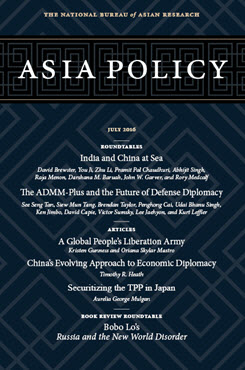A Global People's Liberation Army
Possibilities, Challenges, and Opportunities
This article assesses the factors shaping whether China will develop significant military expeditionary capabilities, the conditions under which Chinese leaders may decide to use the military outside East Asia, and implications for the U.S.
EXECUTIVE SUMMARY
MAIN ARGUMENT
Developing expeditionary capabilities for the People’s Liberation Army (PLA) is a priority for Chinese leaders, and the Chinese public’s expectation for protection while abroad further motivates such plans. Moreover, Chinese strategic thinking about the nature of such a capability suggests that the doctrinal development to support an expeditionary force is already underway. But even if China develops this capability, Beijing may not always choose to use it. The conditions under which China may employ its expeditionary capabilities can be expected to generate four types of behavior depending on the degree to which China is directly targeted and the receptivity of the international community to a larger Chinese role: activism, team play, vigilantism, and free riding. Based on this analysis, the U.S. should be open to a greater role for the PLA under most conditions.
POLICY IMPLICATIONS
- The best outcome for the U.S. is one in which China is a team player and contributes to multilateral operations even when its own interests are only peripherally threatened. Discussion among U.S. allies and partners can help mitigate operational risks.
- When Chinese interests abroad are targeted and the U.S. does not have interests at stake, Washington should try to shape China’s actions to minimize unintended consequences. Depending on the situation, international pressure may be sufficient to prevent vigilantism.
- Given the PLA’s expanding role, the U.S. should work to broaden military exchanges with China to include all U.S. combatant commands, connect defense and diplomatic attachés around the world, and complement global policy objectives.
- China’s expeditionary capabilities create opportunities for the U.S. to develop closer military relationships in Asia—for example, by helping India patrol the Indian Ocean should Chinese naval presence there become routine.
About Asia Policy
Asia Policy is a peer-reviewed scholarly journal presenting policy-relevant academic research on the Asia-Pacific that draws clear and concise conclusions useful to today’s policymakers. Asia Policy is published quarterly in January, April, July, and October and accepts submissions on a rolling basis. Learn more


